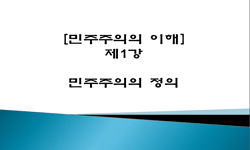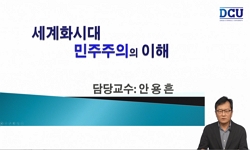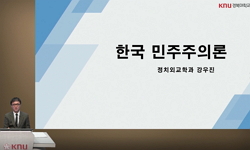1987년 헌법에 의하여 도입된 헌법재판소가 독점적 헌법해석권을 행사함으로써 무소불위의 권력기관으로 군림하고 있음에도 불구하고 이에 대한 민주주의적 통제는 전혀 작동하지 않고 있...
http://chineseinput.net/에서 pinyin(병음)방식으로 중국어를 변환할 수 있습니다.
변환된 중국어를 복사하여 사용하시면 됩니다.
- 中文 을 입력하시려면 zhongwen을 입력하시고 space를누르시면됩니다.
- 北京 을 입력하시려면 beijing을 입력하시고 space를 누르시면 됩니다.
https://www.riss.kr/link?id=A82649637
- 저자
- 발행기관
- 학술지명
- 권호사항
-
발행연도
2011
-
작성언어
Korean
- 주제어
-
KDC
360
-
등재정보
KCI등재
-
자료형태
학술저널
- 발행기관 URL
-
수록면
333-373(41쪽)
- DOI식별코드
- 제공처
- 소장기관
-
0
상세조회 -
0
다운로드
부가정보
국문 초록 (Abstract)
1987년 헌법에 의하여 도입된 헌법재판소가 독점적 헌법해석권을 행사함으로써 무소불위의 권력기관으로 군림하고 있음에도 불구하고 이에 대한 민주주의적 통제는 전혀 작동하지 않고 있다. 이 글은 이런 상황 인식을 바탕으로, 헌법재판소 도입 이후 주류 헌법학계와 시민사회의 대응을 비판적으로 검토한 후 민주주의적 관점에서 헌법재판제도와 헌법재판소의 활동을 어떻게 평가해야 할 것인지를 살펴 보고자 하였다. 이를 위하여 한국사회의 법과 법학 현실의 변혁을 내걸고 창립되어 20여년간 활동해 온 민주주의법학연구회를 중심으로 헌법재판제도에 대한 민주주의적 비판이 어떻게 전개되어 왔고, 그 한계는 무엇인지를 점검하고, 그 과제를 제시하고자 하였다. 구체적으로 이 글에서는 민주주의법학연구회가 수행해 온 작업을 이데올로기 비판, 개별 결정에 대한 분석, 그리고 사회운동적 차원의 대응으로 구분하여 살펴보았다. 결론적으로 민주법연의 핵심적 과제가 지배체제를 뒷받침하는 체제이데올로기에 대한 비판과 대항이데올로기의 창출에 있다는 점을 고려하면, 헌법재판소는 체제이데올로기의 정점에 있는 헌법이데올로기의 창출기관으로서 제대로 주목되고, 치밀하게 분석되고, 충분히 극복되어야 함을 강조하였다. 특히 헌법재판의 민주주의적 정당성이라는 근본적 문제와 더불어 헌법재판소를 근거지우고 있는 제도와 개별 결정들에 대한 분석이 동시적으로 이루어져야 할 뿐만 아니라 그 작동방식의 변화과정에 대한 지속적이면서도 면밀한 검토가 이루어져야 함을 강조하고, 이를 위해서는 다양한 법학 또는 사회과학 전공자들과의 학제적 연구를 통한 집단적 작업이 절실함을 과제로 제안하였다.
다국어 초록 (Multilingual Abstract)
While the Constitutional Court since 1987 has exerted an exclusive power of constitutional interpretation and can now be called even an omnipotent power, the democratic control thereof has never been working. This thesis aims at evaluating the judicia...
While the Constitutional Court since 1987 has exerted an exclusive power of constitutional interpretation and can now be called even an omnipotent power, the democratic control thereof has never been working. This thesis aims at evaluating the judicial review system by the Constitutional Court in a democratic perspective. For the purpose of this, I first tried to prove that both the main-stream legal scholarship and the civil society had wrongly responded to the newly-introduced constitutional court system. And then I investigated how the democratic criticism had been developed. For this, I took as an example the Democratic Legal Studies Association(DELSA), which had allegedly been established to revolutionize the realities of law and legal scholarship in Korea under the slogan of "Toward the day when the people and the law will be one!" since 1989. The activities of the DELSA were analyzed in three categories: Ideological critiques; analyses of the court decisions; and the practical responses to the judicial review system in the dimension of social movement. Considering that the core task of the DELSA is to criticize the dominant ideology and to create a counter-ideology, I suggested some proposals as follows: First, the Constitutional Court as a creator of the constitutional ideology should be properly attended to, analyzed elaborately, and overcome sufficiently. Second, the analyses of its background system and its individual decisions should be performed simultaneously on the one hand, the changes in its form of operation should also be investigated constantly and thoroughly on the other. Finally, it is urgent to do the above mentioned tasks that a collective and interdisciplinary working among legal, human and social scientists should begin immediately.
동일학술지(권/호) 다른 논문
-
영국의 강제퇴거금지법과 주택법에 의한 주택점유자의 점유 보호
- 민주주의법학연구회
- 이은희 ( Eun hee Lee )
- 2011
- KCI등재
-
재개발사업에서 상가임차인에 대한 권리금을 포함한 영업손실 보상
- 민주주의법학연구회
- 김재완 ( Jae Wan Kim )
- 2011
- KCI등재
-
- 민주주의법학연구회
- 이재승 ( Jae Seung Lee )
- 2011
- KCI등재
-
- 민주주의법학연구회
- 조경배 ( Kyung Bae Cho )
- 2011
- KCI등재





 KCI
KCI KISS
KISS







